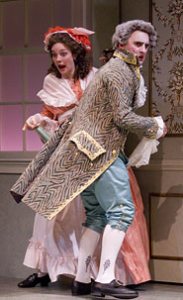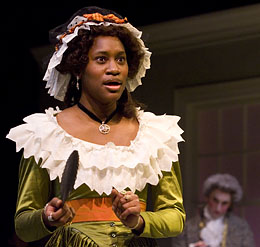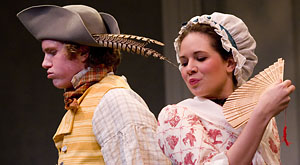Theater department to stage America's first comedy
Paul Kuritz, professor of theater, directs the Bates College theater department production of The Contrast, an American comedy of manners written in 1787 by Royall Tyler. Performances take place at 7:30 p.m. Friday and Saturday, March 9, 10, 16 and 17, and at 2 p.m. Sunday, March 11 and 18, in Gannett Theater, Pettigrew Hall, 2 Andrews Road.
Admission is $6 general admission, and $3 Bates faculty and staff, senior citizens, and non-Bates students. For more information, please call 207-786-6161 or visit the Bates online box office.
The Contrast is considered the first professionally performed play written by a North American. The “contrast” of the title, Kuritz explains, lies in “a phenomenon that has continued to this day. A certain segment of Americans wish America were more like Europe in many different ways, and another segment of Americans thanks God that we are different from Europeans in precisely those same ways.”
A comedy of manners set in post-Revolution America, it depicts a romantic conundrum centering around the character Dimple, a suitor who must choose among three women. Charlotte Manly is a fashionable woman who loves to gossip that Dimple wants her for her beauty; Letitia is a wealthy lady that Dimple considers for her dowry; and Maria is Dimple’s betrothed and an old family friend.
When Charlotte’s brother, the rough-and-ready Henry Manly, arrives and falls for Maria, the stage is set for an evening of merriment.
Tyler was a Revolutionary War veteran, Maine lawyer and eventually the chief justice of Vermont’s Supreme Court. The play satirizes all things British, though it’s written in a British style.
Kuritz edited the play for length and now-obscure historical references. Several costumes in the production, he notes, are on loan from Colonial Williamsburg.
But the central themes of the piece continue to be relevant, he says. “It’s about people being lured by fashion, in their thinking and dress, to their dismay and possible ruin. The character Colonel Manley, in fact, warns that nations and societies might also succumb to such lures.”
Kuritz is the author of a just-published book, The Fiery Serpent (Winepress), that sets forth a contemporary Christian theory of theater. “Theories of dramatic theater include classic theory, neoclassical theory, romantic theory, psychoanalytic theory, Marxist theory, postmodern theory, etc.,” he says.
But not since the early Christian advocate Tertullian, he says, “has an attempt been made to frame a coherent Christian theory of the dramatic arts of theater and film. My book takes a stab at filling that void.”
Using Shakespeare’s Hamlet and Elia Kazan’s powerful film On the Waterfront as examples, Kuritz posits a standard for film and theater that reflects the model God put forth in Creation. He asks, “What is the true purpose of the arts?” and “How is good theater presented?”
Local retailers carrying the book include the Bates College Store, in Chase Hall, Campus Avenue, and the Bible Bookstore on Center Street, Auburn.





